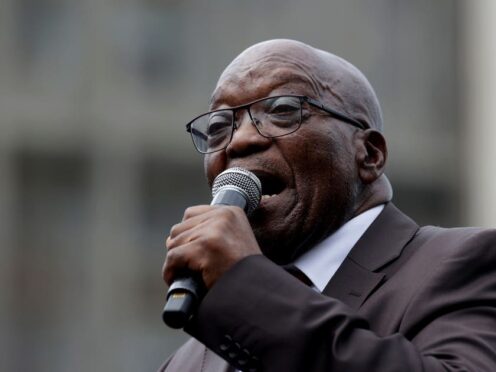
South Africa’s Electoral Court on Tuesday ruled that former president Jacob Zuma can run for office in the upcoming election, overturning an earlier decision that had barred him from contesting the polls.
The decision paves the way for Mr Zuma to run for president on behalf of the uMkhonto weSizwe Party, a new political organisation that he joined last year after denouncing the ruling African National Congress party that he once led.
The Independent Electoral Commission had earlier ruled that Mr Zuma could not run for office because of his criminal record, after it received an objection against his candidature.
South Africa’s constitution does not allow people who have been convicted of a crime and sentenced to more than 12 months in prison without the option of a fine to stand for elections as politicians.
Mr Zuma was convicted and sentenced to 15 months imprisonment in 2021 for defying a court order to appear before a judicial commission probing corruption allegations in government and state-owned companies during his presidential term from 2009 to 2018.
However, in a brief court order released on Tuesday, the court announced that an appeal by Mr Zuma and his party was successful and that the objection against his candidature had been dismissed.
The uMkhonto weSizwe Party welcomed the court decision, saying it had always been its view that the electoral commission’s decision to bar Mr Zuma was wrong.
According to its spokesman Nhlamulo Ndhlela, Mr Zuma would appear on the ballot as the party’s presidential candidate — meaning that he is likely to be elected as a politician. While the MK may get enough votes for parliament seats, it is not clear if it can win a parliament majority, required for its candidate to be chosen for president.
“We are ecstatic at the court verdict because we have always said that President Zuma and the MK Party’s rights have to be upheld,” Mr Ndhlela said. “What this basically means is that he will be our presidential candidate and he will be in parliament after the elections.”
Political analyst Dirk Kotze, from the University of South Africa, said Mr Zuma was likely to use his court victory to promote his argument that the initial ban on his contesting the election was part of a political campaign against him.

Enjoy the convenience of having The Sunday Post delivered as a digital ePaper straight to your smartphone, tablet or computer.
Subscribe for only £5.49 a month and enjoy all the benefits of the printed paper as a digital replica.
Subscribe